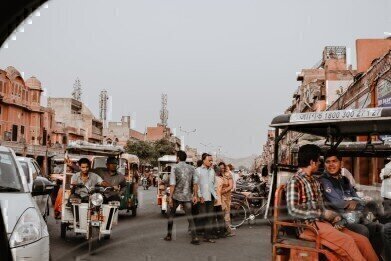Air Clean Up
Can India’s New Car Sales Tax Reduce Pollution?
Mar 21 2016
At the end of last month, the Indian government announced the implementation of a new sales tax, designed to improve air quality and reduce transport-related pollution by curbing congestion in both urban and rural areas.
The tax is applicable to all passenger vehicles and could be as high as 4%, depending on the size of the vehicle and the emissions it is responsible for. It comprises part of the finance minister Arun Jaitley’s yearly budget plan and came into effect immediately.
A Serious Problem
Air quality in India has been a grave concern for many years now. Early in the decade, the Indian super-country overtook China in terms of having more of the most polluted cities in the world, in part due to the commendable measures employed by the Chinese government and a corresponding lethargy from its Indian counterpart in addressing the issue.
In fact, New Delhi was recently named as the most polluted city worldwide and frequently exceeds the maximum limits imposed in the US and Europe by as much as 15 or 20 times.
However, the new legislation aims to combat the problem by discouraging sales of new cars – itself an audacious and unexpected show of determination and defiance in the face of India’s powerful automotive industry.
“There are some things that are politically palatable now that were not before,” explained Samir Saran, who is head of the Observer Research Foundation based in the nation’s capital. “Jaitley has seen there is political space and public support. Once Indians owning cars was seen as a sign of economic success. Now this sort of tax is seen as Indians being responsible.”
The Turning of the Tide?
Is the new measure, as Saran predicts, an indication that attitudes towards pollution are finally changing in India? Recent history would suggest so. The sales tax is just the latest in a string of initiatives introduced by Delhi and India in a bid to reduce pollution and rid the country of its contaminating reputation.
In December of last year, the government announced it was banning all older buses and trucks throughout the country in an attempt to remove some of the more polluting vehicles from its streets. Later the same month, an exceptionally poor spate of pollution prompted the government into ordering all even- and all odd-numbered license plated cars off the road on alternate days of the month during the first two weeks of January.
The success of the scheme was dubious, largely due to the incompliance of much of the population and an inability to enforce it due to insufficient police numbers. However, officials have announced it will be reintroduced in April, claiming that while it may not have done much to curb emissions, it did help to raise awareness and received warm public backing, including from one of the country's top judges.
The latest tax will impose a 1% levy on all petrol cars of smaller size and an engine less than 1,200cc. This figure will reach 2.5% for diesel cars with an engine smaller than 1,500cc, while SUVs and other over-sized diesel vehicles will be taxed at 4%.
As well as helping in the fight to reduce congestion and bring down pollution levels, the scheme is also expected to earn the government around 30 billion rupees, or £316 million, in tax revenue.
Events
May 05 2024 Seville, Spain
May 13 2024 Munich, Germany
May 23 2024 Beijing, China
May 23 2024 Beijing, China
Jun 10 2024 Algiers, Algeria














